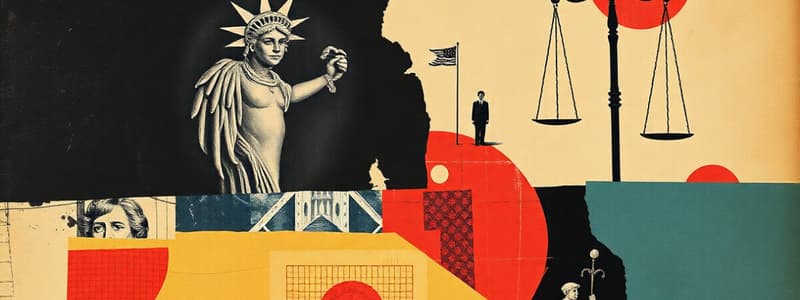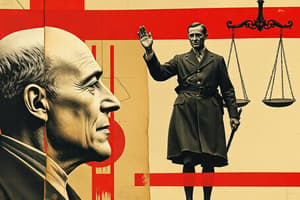Podcast
Questions and Answers
According to Hobbes' Contract Theory, what happens without a societal agreement?
According to Hobbes' Contract Theory, what happens without a societal agreement?
- A war of 'all against all' occurs. (correct)
- Individuals become self-sufficient.
- Individuals experience total freedom.
- A peaceful coexistence is established.
What does Hobbes identify as the source of justice?
What does Hobbes identify as the source of justice?
- The desires of the majority.
- The law issued by a sovereign. (correct)
- The moral values of the society.
- The individuals within society.
What does sovereignty represent in the context of positive law?
What does sovereignty represent in the context of positive law?
- The restriction of power under law.
- The representation of the will of the people.
- The ultimate, unrestricted power. (correct)
- The ability to enforce fairness.
What is the implication of tacit consent regarding laws?
What is the implication of tacit consent regarding laws?
What was H.L.A. Hart's main criticism of John Austin's theory?
What was H.L.A. Hart's main criticism of John Austin's theory?
What does the term 'reasonable' imply in the political context?
What does the term 'reasonable' imply in the political context?
What is the 'Liberal Principle of Legitimacy'?
What is the 'Liberal Principle of Legitimacy'?
What does 'Overlapping Consensus' refer to in a diverse society?
What does 'Overlapping Consensus' refer to in a diverse society?
What is described as 'Modus Vivendi'?
What is described as 'Modus Vivendi'?
What is meant by 'Public Reason' in political discussions?
What is meant by 'Public Reason' in political discussions?
What is the first principle of Rawls' theory of justice as fairness?
What is the first principle of Rawls' theory of justice as fairness?
Which of the following best describes Schmitt's Absolute Constitution?
Which of the following best describes Schmitt's Absolute Constitution?
What does the Difference Principle entail according to Rawls?
What does the Difference Principle entail according to Rawls?
How does Schmitt view the Relative Constitution?
How does Schmitt view the Relative Constitution?
What characterizes Schmitt's Ideal Constitution?
What characterizes Schmitt's Ideal Constitution?
What is the primary focus of the political concept of justice?
What is the primary focus of the political concept of justice?
What does Rawls argue is necessary for a constitution to be considered legitimate?
What does Rawls argue is necessary for a constitution to be considered legitimate?
Which aspect is NOT part of the political concept of justice?
Which aspect is NOT part of the political concept of justice?
What role do existing historical vocabularies play in the political concept of justice?
What role do existing historical vocabularies play in the political concept of justice?
What is a key characteristic of a well-ordered society according to the political concept of justice?
What is a key characteristic of a well-ordered society according to the political concept of justice?
What distinguishes Dworkin's principles from rules?
What distinguishes Dworkin's principles from rules?
Which statement best reflects H.L.A. Hart's perspective on legal positivism?
Which statement best reflects H.L.A. Hart's perspective on legal positivism?
What is the main focus of L.L. Fuller's philosophy regarding natural law?
What is the main focus of L.L. Fuller's philosophy regarding natural law?
How does soft legal positivism differ from hard legal positivism?
How does soft legal positivism differ from hard legal positivism?
According to Dworkin, what role does interpretation play in law?
According to Dworkin, what role does interpretation play in law?
What is required for constituent power to come into play according to Rawls' principles?
What is required for constituent power to come into play according to Rawls' principles?
What differentiates higher law from ordinary law in Rawls' constitutionalism?
What differentiates higher law from ordinary law in Rawls' constitutionalism?
Which characteristic defines a democratic constitution in Rawls' view?
Which characteristic defines a democratic constitution in Rawls' view?
In the context of Rawls' principles, what is the significance of the separation of powers?
In the context of Rawls' principles, what is the significance of the separation of powers?
According to Rawls, who holds ultimate power in a constitutional democracy?
According to Rawls, who holds ultimate power in a constitutional democracy?
What does legal positivism assert about the origin of law?
What does legal positivism assert about the origin of law?
What is the primary distinction made by legal positivism regarding law and morality?
What is the primary distinction made by legal positivism regarding law and morality?
According to natural law, what must be included in the content of the law?
According to natural law, what must be included in the content of the law?
How does legal positivism define law as a system?
How does legal positivism define law as a system?
What do moral judgments lack according to the principles of legal positivism?
What do moral judgments lack according to the principles of legal positivism?
Which type of secondary rule governs changes in status, such as contracts and wills?
Which type of secondary rule governs changes in status, such as contracts and wills?
According to Locke, what is essential in a commonwealth to prevent it from being worse than the state of nature?
According to Locke, what is essential in a commonwealth to prevent it from being worse than the state of nature?
What is the perspective of contemporary natural law regarding the validity of law?
What is the perspective of contemporary natural law regarding the validity of law?
Which of the following best describes sovereignty?
Which of the following best describes sovereignty?
What is suggested as a broader concept related to the workings of the law?
What is suggested as a broader concept related to the workings of the law?
What does the normative sense of law refer to?
What does the normative sense of law refer to?
According to the content, when is law considered defective?
According to the content, when is law considered defective?
What distinguishes regulative rules from constitutive rules?
What distinguishes regulative rules from constitutive rules?
What is implied by Karl Schmitt’s viewpoint on community goals?
What is implied by Karl Schmitt’s viewpoint on community goals?
Which statement about constitutional rights is accurate?
Which statement about constitutional rights is accurate?
What does the 'Veil of Ignorance' concept require individuals to do?
What does the 'Veil of Ignorance' concept require individuals to do?
What is 'Justice as Fairness' primarily concerned with?
What is 'Justice as Fairness' primarily concerned with?
What is the main goal of Rawls's concept of Reflective Equilibrium?
What is the main goal of Rawls's concept of Reflective Equilibrium?
Which of the following best describes the 'Original Position'?
Which of the following best describes the 'Original Position'?
What does the 'Fact of Pluralism' acknowledge?
What does the 'Fact of Pluralism' acknowledge?
How does Rawls differentiate between justice and utilitarianism?
How does Rawls differentiate between justice and utilitarianism?
In what context does Rawls argue that justice becomes particularly important?
In what context does Rawls argue that justice becomes particularly important?
What aspect does Rawls emphasize when discussing intentions vs outcomes?
What aspect does Rawls emphasize when discussing intentions vs outcomes?
Flashcards
Hobbes' State of Nature
Hobbes' State of Nature
A hypothetical scenario where there are no laws or government, leading to chaos and a 'war of all against all'.
Social Contract
Social Contract
Individuals voluntarily agree to give up some freedom in exchange for the protection and order of a society.
Sovereignty
Sovereignty
The ultimate power in a society, often associated with a ruler or government, not bound by any higher authority.
Tacit Consent
Tacit Consent
Signup and view all the flashcards
Hart's Criticism of Austin
Hart's Criticism of Austin
Signup and view all the flashcards
Well-Ordered Society
Well-Ordered Society
Signup and view all the flashcards
Rational vs. Reasonable
Rational vs. Reasonable
Signup and view all the flashcards
Burden of Judgment
Burden of Judgment
Signup and view all the flashcards
Liberal Principle of Legitimacy
Liberal Principle of Legitimacy
Signup and view all the flashcards
Overlapping Consensus
Overlapping Consensus
Signup and view all the flashcards
Political Concept of Justice
Political Concept of Justice
Signup and view all the flashcards
Fairness in Justice
Fairness in Justice
Signup and view all the flashcards
What makes law law?
What makes law law?
Signup and view all the flashcards
Legitimacy of Law
Legitimacy of Law
Signup and view all the flashcards
Broad Agreement in Law
Broad Agreement in Law
Signup and view all the flashcards
Dworkin's Argument
Dworkin's Argument
Signup and view all the flashcards
Dworkin's Rules vs. Principles
Dworkin's Rules vs. Principles
Signup and view all the flashcards
Hart's Soft Positivism
Hart's Soft Positivism
Signup and view all the flashcards
Hard Legal Positivism
Hard Legal Positivism
Signup and view all the flashcards
Soft Legal Positivism vs. Hard Legal Positivism
Soft Legal Positivism vs. Hard Legal Positivism
Signup and view all the flashcards
Political Liberalism
Political Liberalism
Signup and view all the flashcards
Rawls' Theory of Justice
Rawls' Theory of Justice
Signup and view all the flashcards
The Difference Principle
The Difference Principle
Signup and view all the flashcards
Absolute Constitution
Absolute Constitution
Signup and view all the flashcards
Relative Constitution
Relative Constitution
Signup and view all the flashcards
Rules of Change
Rules of Change
Signup and view all the flashcards
Rules of Adjudication
Rules of Adjudication
Signup and view all the flashcards
Rules of Recognition
Rules of Recognition
Signup and view all the flashcards
Locke's Natural Law
Locke's Natural Law
Signup and view all the flashcards
Contemporary Natural Law
Contemporary Natural Law
Signup and view all the flashcards
Constituent Power (Rawls)
Constituent Power (Rawls)
Signup and view all the flashcards
Higher Law vs. Ordinary Law
Higher Law vs. Ordinary Law
Signup and view all the flashcards
Democratic Constitution
Democratic Constitution
Signup and view all the flashcards
Separation of Powers (Rawls)
Separation of Powers (Rawls)
Signup and view all the flashcards
Ultimate Power (Rawls)
Ultimate Power (Rawls)
Signup and view all the flashcards
Descriptive Law
Descriptive Law
Signup and view all the flashcards
Normative Law
Normative Law
Signup and view all the flashcards
Defective Law
Defective Law
Signup and view all the flashcards
Regulative Rules
Regulative Rules
Signup and view all the flashcards
Constitutive Rules
Constitutive Rules
Signup and view all the flashcards
Just Principles
Just Principles
Signup and view all the flashcards
Veil of Ignorance
Veil of Ignorance
Signup and view all the flashcards
Reflective Equilibrium
Reflective Equilibrium
Signup and view all the flashcards
Original Position
Original Position
Signup and view all the flashcards
Justice as Fairness
Justice as Fairness
Signup and view all the flashcards
Circumstances of Justice
Circumstances of Justice
Signup and view all the flashcards
Reasonable Pluralism
Reasonable Pluralism
Signup and view all the flashcards
Fact of Pluralism
Fact of Pluralism
Signup and view all the flashcards
Grundnorm
Grundnorm
Signup and view all the flashcards
Legal Positivism: Law's Origin
Legal Positivism: Law's Origin
Signup and view all the flashcards
Natural Law: Law's Content
Natural Law: Law's Content
Signup and view all the flashcards
Separation of Law and Morality
Separation of Law and Morality
Signup and view all the flashcards
How are Legal Judgments Different?
How are Legal Judgments Different?
Signup and view all the flashcards
Study Notes
Different Views of Positive Law
- Hobbes: Life in the state of nature would be chaotic. That's why individuals decide to form a society in order to have protection. It's a war of all against all. To assume peace is essential.
- Hobbes' insights from his work:
- Justice is injustice comes from the law: law is a command with sanctions issued by a sovereign.
- Sovereignty = ultimate power, unrestricted; it can't be under a fundamental law.
- Tacit Consent: If no one objects to a law, that means just everyone accepts it. This is why people should obey rules because there's fear of punishment (sovereign).
- The sovereign needs to be obeyed & doesn't obey anyone else.
- H.L.A. Hart's Criticism of Austin: Hart feels that Austin's theory is too simplistic for the new legal orders. Individuals obey rules because they trust the legitimacy.
Studying That Suits You
Use AI to generate personalized quizzes and flashcards to suit your learning preferences.




